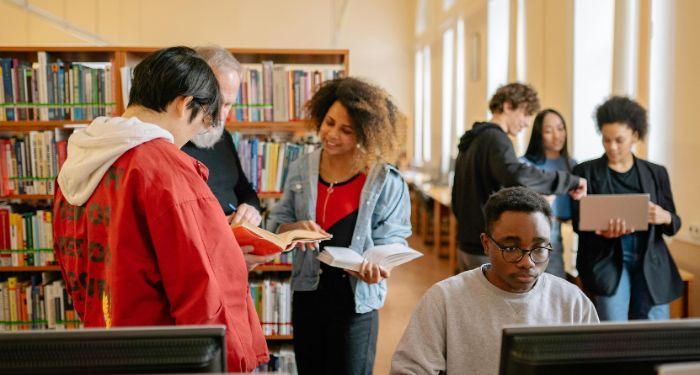

Civic engagement has always been important, but now? It might mean the difference between democracy and dictatorship. Everyone needs to be involved in their communities, and work towards making them better, fairer, and more inclusive places. If you’re wondering how? Well, libraries are a key player.
What is civic engagement?
Civic engagement is the process through which people seek to make a difference in their communities through a wide range of means. At its core, civic engagement is about making our communities better, about “promoting the quality of life in a community, through both political and non-political processes” (according to the book Civic Responsibility and Higher Education, as quoted by Youth.gov).
Civic engagement takes on many forms. Among them can be found “paid and unpaid forms of political activism, environmentalism, and community and national service.” In other words: you can up your civic engagement based on your own strengths.
The role of libraries
Libraries are uniquely positioned to improve civic engagement in their communities. As an institution that grants access to knowledge and information for free, they will always be central to a democratic society. Christine Becker, then Senior Consultant for the Urban Libraries Council, said in 2018: “Civic engagement is an essential component of what libraries do; it’s kind of why they exist.”
In 2014, the American Library Association (ALA) launched Libraries Transforming Communities. This initiative sought to train librarians to “facilitate community conversations and provide resources to support these discussions.”
Some (non-exhaustive) ways to make your library a stronger place for civic engagement
Hosting voter registration drives
This is particularly important in an era where real effort is being made to disenfranchise people. Libraries are, as mentioned above, hubs of democracy, which makes them natural institutions to help people make sure they are registered to vote. Toolkits can be found in Rock the Vote.
Hosting community conversations
If there’s one thing libraries are perfectly situated to do, it’s hosting community conversations, lectures, and events. Dialogue, after all, is key to democracy and the free flow of information. However, in a climate as partisan and divided as the current one, it’s important to make sure that there’s a trained person facilitating the conversation. That’s where librarians, and initiatives like Libraries Transforming Communities, come in.
- Censorship: It’s hardly a secret that censorship is on the rise, in the United States and too many other countries. Kelly Jensen has done a lot of fantastic work on censorship in the United States and should be required reading for anyone who wants to a) learn about the situation, and b) know what they can do to help combat it. But there’s a lot libraries can do, too, including holding lectures and conversations on the causes, the effects, and the solutions to this rampant abuse of power.
- Environmentalism: Our world is quite literally on fire at this point, but not too many people think there’s much libraries can do about it. Wrong. Libraries can (and do) provide crucial information, but can do so even more by hosting talks and conversations about the current state of the environment, and what can be done — both on the individual and community levels.
- Political campaigns: Ho boy. Few things make people more passionate than elections, especially at the national and state levels. Libraries can ensure that their patrons know all the key points of each candidate’s campaign, and conduct a basic fact check for the main points. They can also encourage people to pay more attention to local elections and emphasize that they’re much more important than one might think.
- Ways to identify misinformation: This one is pretty closely linked to the previous items, but it gets its own bullet point because misinformation has become a giant issue on its own. Everything, literally, can and has been twisted and lied about at some point. From public health to education to political figures, lies are popping out of the woodwork, and AI hasn’t helped at all. So libraries should conduct conversations, talks, and workshops about ways to identify misinformation and improve media literacy in general.
- Public policy: Ignorance of public policy is a big problem that curtails people’s freedom and impedes their rights. So Public Policy 101 talks, with some time devoted to answering questions, could go a long way towards making people more aware of the way they move in the world.
A parting word
Most of us want to live in a kinder, more inclusive society. But things won’t improve unless we’re all taking action to make it so. Libraries are a crucial space to help make that happen — so don’t be shy about asking your local library to carry on any of these initiatives. They might very well say yes.

